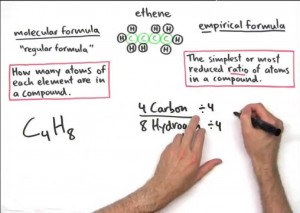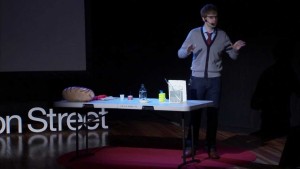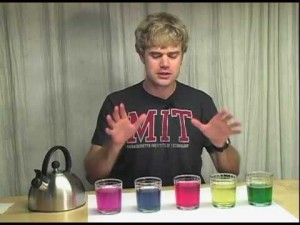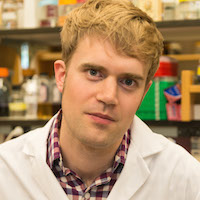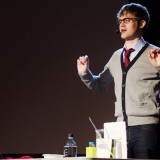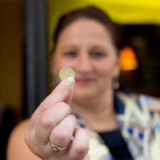A story about the way to end the war between educational videos and teachers, the textbooks that get realtime updates and the way students can plan to learn and learn to plan.
THERE IS A BEACON ON BEACON STREET
Take the road down Beacon Street. There, in front of a lab desk and with the TEDx logo in the background, Tyler is talking about his passion for science. And his work in teaching science to kids.
There are still few people in the world that I’ve interacted with who can talk about their passion and work at the same time. And this is why the audience at TEDxBeaconStreet was completely mesmerized by the story that Tyler shares.
The story of a group of high school students from underserved backgrounds that he taught science to through the MITES summer program – a group who didn’t have any interest in learning chemistry and biology. Until he beat the textbook. Until he made it fun.
It’s been 7 years now since Tyler DeWitt, a PhD graduate in Microbiology from MIT, posted his first science teaching video on Youtube – his science channel now has more than 100.000 subscribers! What he thought it’s going to be helpful for teaching kids in his classroom turned out to become a viral learning approach – his students found the videos so interactive and easy to understand that they started sharing them with students from their school and from other schools.
I felt like I wanted to become a tiny version of myself and put myself into a bottle for kids to take me home with them – just to be able to somehow continue that interactive learning experience we started in the classroom, says Tyler.
When we started our Skype call, I challenged him to imagine what he would do if he were a student in his own class.
You know, it may sound weird but I didn’t become interested in science because of my teachers. I actually had a terrible chemistry teacher. I taught myself because I enjoyed learning and I understood early on that I wanted to teach. During college, I continued to study science and going through a series of boring classes made me realize that learning could be much more exciting. My students weren’t learning as much as they could and this is why I started the Youtube channel. At first, I didn’t think that other students would watch the videos but I realized that teaching with videos is changing their perspective on science and learning overall. If I were a student now in this kind of class, I would be much more inclined to go into science as a career.
Tyler believes in the power of video content of enhancing learning experiences and he considers that this is not only a major contemporary means of communication but also the future type of universal literacy for education. But does this mean that teachers will be replaced by videos?
There is so much resistance still from teachers to use videos during their classes because of this fear that digital technologies are replacing educators. But a teacher is so much more than just a mouth explaining a textbook. Why would a teacher not let a video explain the principles in the textbook in a faster and easier way and use the extra time for discussions, experiments, trips?
EDUCATING EDUCATION
The discussion with Tyler is triggering more and more questions about the education systems – questions that point to a long-term vision – one that is not just a utopia but an applicable perspective. He goes on to tackle homework.
So we could have all this extra time. And we can also save time from the home projects teachers assign to their students. How do they not know that everyone’s parents are just doing all the work?!? It’s not only about the time the students could gain for direct learning, it’s also about the time teachers lose correcting papers or reviewing homework.
The education system could learn a lot from the way the online environment works. In the digital world, critical thinking is normal and feedback is the basis of evolving. Tyler goes back to the classroom:
Teachers are still not very good at taking feedback. Students are still raised to just respect the authority of their teacher. And this needs to change. Students should be more open to give feedback and to review the performance of their teachers. In the online communities, teaching quality matters and one has so many ways of measuring it. Why shouldn’t it matter in the offline environment, too?
We start imagining a system where teachers can get votes and rankings, comments and reviews in order to evaluate and match them with certain groups of students.
This is essential – customizing learning. Because an amazing teacher doesn’t tell you how to solve a problem, he shows you how to figure out solving the problem on your own based on your set of skills and level of understanding.
I am starting to wonder whether education can solve the problems of education from within the system. It is a kind of metacognition technique – thinking about one’s own thinking. What if educators, teachers, students would start thinking about their own ways to create curriculums, teach subjects and learn theories or practices? This is happening, no doubt about it – there are international conferences, national forums, school meetings on these topics but what if there could be an elective course on learning how to learn at one’s school?
That would be a dream, I would love to teach that course. Learning how to learn is the most important skill, especially for the generation of young people nowadays. Why especially for this generation? Because now, more than in any other period in history, knowledge is no longer static. So educational content and teaching methods should become more and more dynamic to respond to this.
OPEN LINK IN NEW LESSON
It’s his turn to challenge me to stretch my former highschool student mind. What if textbooks, videos and any educational materials could be updated (and made better) almost in realtime through the feedback of students?
While doing the science videos on Youtube, I talked many times with kids telling me that they were confused about a certain part or topic and because of the fast feedback, I was able to update my educational content as we went through the topic. This has never been possible before.
Feedback from his students and viewers helped him understand what virality means when it comes to educational content. He gives me the example of the Minute Physics and Veritasium channels on Youtube that are extremely popular even though they didn’t invest enormous amounts of money in marketing. They became popular because they teach youngsters about cool topics in short videos that are straight to the point, enjoyable and deeply engagin in their storytelling manner.
The growth of video as an educational tool (if not, an entire method) along with the success of his Youtube channel determined him to start and coordinate the MIT + K12 video outreach project where experts in technology fields (from exoplanets to robotics and skydiving) opened their advanced labs and offered their knowledge for free to viewers. My opinion is that this is the next step of the MOOC revolution – besides gaining free knowledge by taking courses from international universities, having digital access to real science and real scientists could become the most effective way of learning. He goes further:
Don’t look at STEM just as a buzzword or government strategy. Start trying to find out what STEM really is like. Maybe that means finding an engineer in your city who designs cars or roller coasters and asking to shadow him and see what it’s like.
All these led to his work with Socratic, an educational platform focused on crowd-teaching – a method that enables fast learning by questions and answers within a global community of students. Based on his belief that learning should be customized based on feedback, he also took the responsibility of coordinating content development at Net Texts, an education startup that is giving teachers the opportunity to create their own lessons and curate educational resources on the web in such a way that they devise their own curriculum – adapted to the groups of students they teach.
In this context, he imagines a not so far away future when his students can be the next creators of educational content:
I believe that education can come from anybody. Thus, I would love to design a class with my students for the next generation of students. And they can definitely do it. Teaching information is the best way of learning it. and it can also teach them how to communicate effectively to various audiences which is one of the best skills one could get while learning or teaching.
He mentions one of his former students, Maximus Thaler, who started an entire national movement – The Gleaner’s Kithchen – educating people ‘to transform waste into wealth’. And when young people start creating more and more educational content, adapted for their needs, pace and level of understanding, their young viewers will start learning more and more by themselves. And this attitude will no longer be an exceptional feature but an innate trait. Sugata Mitra’s program – School in the Cloud – pops up as a reference:
We can train young people to become self-learners. And this is especially effective in poor communities. There, the passion for learning stems from understanding the fact that education is an extraordinary way of confronting loss aversion as the famous behavioural economist Daniel Kahneman explains.
HOW EXTRAORDINARY CAN BE NORMAL
This gets us to our next concern. We too often forget that education is not only about learning but also about planning. With so many free educational resources out there on the web and so many industries rising, there are so many potential paths and opportunities that it becomes common for young people with enormous potential to get lost in the abundance of knowledge (that – in a Big Data world – we are still scared and happy for at the same time).
The learning experience is easily customizable nowadays. But it is not so easy to find the right resources at the right time for the right person. Teachers, educators, mentors are still needed to understand what gets a student initially excited and connect that enthusiasm and willingness to learn with academic subjects.
This is why, even though he wears the scientist and teacher hats, too – being a digital content creator is his career’s and life’s mission and, in order to inspire students in following science as a career and establish a life plan, he will also be launching a new Youtube series on how we do science.
When I first watched the TED talk, I didn’t feel (just) inspired. After talking for almost two hours, the ideas that Tyler shared triggered my curiosity which, from my point of view, is a much bigger incentive to act than mere inspiration. And this makes me see him not only as an extraordinary educator but also as a thinker and creator of extraordinary learning experiences. Experiences that – even though extraordinary – should become the standard in the digital near future.

